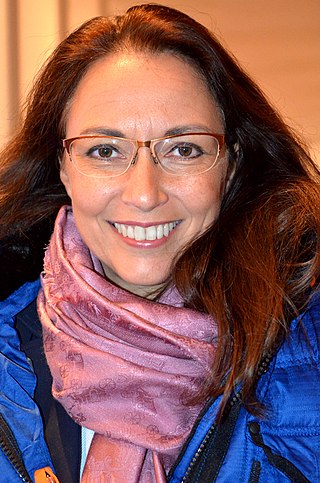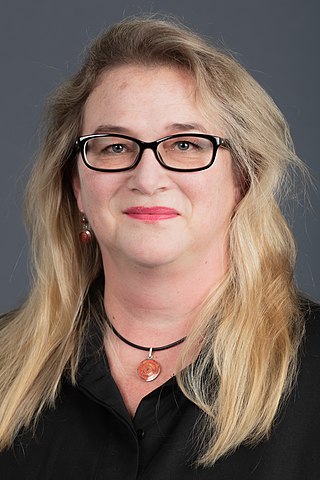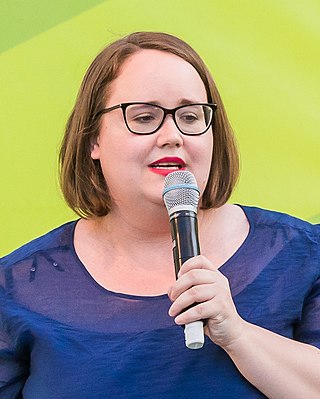Related Research Articles

Petra Karin Kelly was a German Green politician and ecofeminist activist. She was a founding member of the German Green Party, the first Green party to rise to prominence both nationally in Germany and worldwide. In 1982, she was awarded the Right Livelihood Award for "forging and implementing a new vision uniting ecological concerns with disarmament, social justice and human rights."
The German Green Party has been present in the German parliament (Bundestag) continuously since 29 March 1983 as a parliamentarian party. The status as a fraktion was lost from 1990 to 1994, being demoted to a Gruppe (group), after only the East German wing managed to pass the 5% election threshold in the December 1990 German federal election.

Edelgard Bulmahn is a German politician from the Social Democratic Party of Germany (SPD). She served as Member of the German Bundestag between 1987 and 2017. She was Federal Minister of Education and Research from 1998 to 2005. From 2013 until 2017 she was elected as one of the Vice Presidents of the Bundestag.

Annemarie Renger was a German politician for the Social Democratic Party of Germany (SPD).

Yvonne Ploetz is a German politician and member of SPD former member of The Left. On 1 February 2010, she became a member of the German Parliament when she succeeded Oskar Lafontaine.

Yasmin Fahimi is a German trade unionist and politician who has been chairing the German Trade Union Confederation (DGB) since 2022.

Maria Franziska Flachsbarth is a German veterinarian and politician of the Christian Democratic Union of Germany (CDU) who served as Parliamentary State Secretary in the Federal Ministry for Economic Cooperation and Development in the fourth coalition government of Chancellor Angela Merkel from 2018 to 2021. Since 2011, she has also served as the president of the German Catholic Women's Association.

Nina Scheer is a German lawyer and politician of the Social Democratic Party (SPD) who has been a member of the Bundestag since 2013. Her political interests include energy policy and climate change. In 2019, Scheer was an unsuccessful candidate in the 2019 Social Democratic Party of Germany leadership election, in a team with Karl Lauterbach. Her father was Hermann Scheer, also a SPD Bundestag member.

Margarete Bause is a German politician of Alliance 90/The Greens. She was a member of the Landtag of Bavaria from 1986 to 1990 and from 2003 to 2017 before serving as a member of the Bundestag from 2017 until 2021, where she was her parliamentary group's spokeswoman for human rights and humanitarian aid.

Beate Walter-Rosenheimer is a German politician of Alliance 90/The Greens who has been serving as a member of the Bundestag from the state of Bavaria since 2012. Prior to her political career, she worked as a freelance psychologist. In parliament, she has served on various committees and was her parliamentary group's spokesperson for youth policy, education, and training.

Katrin Budde is a German politician of the Social Democratic Party (SPD), who has been serving as a member of the Bundestag from the state of Saxony-Anhalt since 2017.
Agnes Asche, also known as Agnes Bertram and Agnes Jünemann, was a German socialist who resisted the Nazis. A street in Hanover is named in her honor.

Heidi Reichinnek is a German politician and Member of the Bundestag from Die Linke. Since 2024, she has been serving as the Leader of The Left in the Bundestag, alongside Sören Pellmann.
Jakob Blankenburg is a German politician of the Social Democratic Party (SPD) who has been serving as a member of the German Bundestag since 2021, representing the Lüchow-Dannenberg – Lüneburg district.

Ricarda Lang is a German politician who has been serving as co-leader of the Alliance 90/The Greens since January 2022, alongside Omid Nouripour. She has been a member of the Bundestag since 2021. Previously, she was co-deputy leader of the party and spokeswoman for women's policy from 2019 to 2021, and co-leader of the Green Youth from 2017 to 2019.

Mareike Lotte Wulf is a German politician (CDU) who has been serving as a member of the German Bundestag since 2021. From 2017 to 2021, she was a member of the Lower Saxony state parliament.
Claudia Winterstein is a German politician. She served as Member of the Bundestag for the Free Democratic Party (FDP) from 2002 to 2013, and was her party's Parliamentary Secretary between 2005 and 2009. She served multiple terms on the Hannover city council, and also worked as a certified economy correspondent, a lecturer, a research assistant, and a property management executive.
Christa Nickels is a German former nurse and politician of Alliance 90/The Greens who served as Parliamentary State Secretary to the Federal Minister of Health and Commissioner on Narcotic Drugs in the cabinet of Chancellor Gerhard Schröder.
Helene-Charlotte (Lenelotte) von Bothmer née Wepfer, was a German politician (SPD) and writer.

Waltraud Schoppe has served as a teacher and politician in Germany. She left school at a young age and worked as a secretary, later marrying and earning a teaching certificate. She became involved in university politics and the anti-nuclear and women's movements in the 1970s. A founding member of the West German Green Party, she made a taboo-breaking speech in the Bundestag in 1983 on the subject of abortion and marital rape, challenging for the first time the sexism women encountered in the legislature. She was one of the members of the first all-woman party directorates in Germany, when the Green Party elected six women to head the party in 1984.
References
Citations
- 1 2 3 4 5 6 Vierhaus & Herbst 2002, p. 134.
- 1 2 Lebert 1984, p. 99.
- ↑ Ott, Schimpf & Dietrich 2008, pp. 6–7.
- 1 2 Ott, Schimpf & Dietrich 2008, p. 6.
- ↑ Ott, Schimpf & Dietrich 2008, p. 7.
- 1 2 Lebert 1984, p. 96.
- 1 2 International Herald Tribune 1984, p. 1.
- 1 2 Lebert 1984, pp. 96, 98.
- 1 2 Hockenos 2008, p. 181.
- 1 2 Langguth 2019, p. 11.
- 1 2 3 4 Hansen, Helm & Reichherzer 2015, pp. 62–63.
- 1 2 3 Williams 1984, p. 3B.
- 1 2 Reaves 1984, p. 15A.
- ↑ Strek 1999, p. 39.
- ↑ Allen 2022, pp. 125–126.
- ↑ Die Welt 1985, p. 8.
- ↑ Wieland 2012, p. 84.
- ↑ Schmidt 2022, pp. 501, 513.
- ↑ Bause 1999, p. 132.
- ↑ Mies & Shiva 1993, p. 229.
- ↑ Bause 1999, p. 136.
- ↑ Jasanoff 2007, p. 59.
- ↑ Jasanoff 2007, p. 60.
- ↑ Ott, Schimpf & Dietrich 2008, pp. 6–7, 26.
- ↑ Ö-Punkte 1997, p. 30.
- ↑ Brieden 2020.
- ↑ Friedensbüro Hannover 2023.
- ↑ Miyakawa 2023.
- ↑ Lutz 2021.
- 1 2 Steinbauer 2023.
Bibliography
- Allen, Jennifer L. (2022). Sustainable Utopias: The Art and Politics of Hope in Germany. Cambridge, Massachusetts: Harvard University Press. doi:10.4159/9780674276208. ISBN 978-0-674-27620-8. – via De Gruyter (subscription required)
- Bause, Margarete (1999). "Natur als Grenze? Modernes und Gegenmodernes im grünen Diskurs [Nature as a Boundary? Modern and Counter-Modern in the Green Discourse]". In Beck, Ulrich; Jaher, Maarten A.; Kesselring, Sven (eds.). Der unscharfe Ort der Politik: empirische Fallstudien zur Theorie der reflexiven Modernisierung[The Blurred Place of Politics: Empirical Case Studies on the Theory of Reflexive Modernization] (in German). Opladen: Leske + Budrich. pp. 129–150. doi:10.1007/978-3-322-97437-2. ISBN 978-3-8100-2284-4. – via Springer Link (subscription required)
- Brieden, Hubert (16 June 2020). ""Büchel ist überall! Atomwaffenfrei jetzt" – Gespräch mit Heidemarie Dann" ['Büchel Is Everywhere! Nuclear-Free Now': Conversation with Heidemarie Dann]. Radio Flora (in German). Hanover, Germany: Freundeskreis Lokal-Radio Hannover e.V. Archived from the original on 10 December 2023. Retrieved 9 June 2024.
- "Das Fehlverhalten in der Ehe - scharf eingegrenzt" [Misconduct in Marriage – Sharply Defined]. Die Welt (in German). No. 291. Essen, Germany. 15 December 1985. p. 8. Retrieved 9 June 2024.
- "Die UNO – welchen Stellenwert hat sie heute, welchen könnte sie haben?" [The UN – What Importance Does It Have Today, What Importance Could It Have?]. Friedensbüro Hannover (in German). Hanover, Germany: Friedensbüro Hannover verantwortet. 5 September 2023. Archived from the original on 22 September 2023. Retrieved 9 June 2024.
- "Greens Party Replaces Top Leadership". No. 31, 454. Paris, France. 5 April 1984. p. 1. Retrieved 8 June 2024.
- Hansen, Jan; Helm, Christian; Reichherzer, Frank (2015). Making Sense of the Americas: How protest Related to America in the 1980s and Beyond. Frankfurt am Main, Germany: Campus Verlag. ISBN 978-3-593-50480-3.
- Hockenos, Paul (2008). Joschka Fischer and the Making of the Berlin Republic: An Alternative History of Postwar Germany. Oxford, Oxfordshire: Oxford University Press. ISBN 978-0-19-518183-8.
- Jasanoff, Sheila (2007). Designs on Nature: Science and Democracy in Europe and the United States (5 hardback ed.). Princeton, NJ: Princeton University Press. ISBN 978-0-691-13042-2.
- Langguth, Gerd (2019). The Green Factor in German Politics: From Protest Movement to Political Party. Translated by Straus, Richard. London, UK: Routledge. ISBN 978-0-367-29266-9.
- Lebert, Norbert (3 October 1984). "Der weibliche Vorstand der grünen Fraktion: Was ist an diesen Frauen so exotisch?" [The Female Executive of the Green Party: What Is So Exotic about These Women?]. Brigitte (in German). No. 21. Hamburg, Germany: Gruner + Jahr. pp. 96–100. ISSN 0931-8763 . Retrieved 7 June 2024.
- Lutz, Cosima (25 August 2021). "'In diesem Kreis, meine Dame, sind auch Sie ein Herr!;" ['In This Circle, My Lady, You Too Are a Gentleman!']. Die Welt (in German). Berlin, Germany. Archived from the original on 27 June 2023. Retrieved 9 June 2024.
- Mies, Maria; Shiva, Vandana (1993). Ecofeminism. London New York: Zed Books. ISBN 978-1-85649-155-6.
- Miyakawa, Sachiko (20 February 2023). "Hiroshima A-Bomb Survivor's Accounts Translated into German to Pass on Antinuclear Wishes". Mainichi Shimbun . Osaka, Japan. Archived from the original on 8 June 2024. Retrieved 9 June 2024.
- Ott, Cornelia; Schimpf, Ute; Dietrich, Silke (2008). 1977–2007: 30 Jahre Frauenhaus Hannover [1977–2007: 30 Years of the Hanover Women's Shelter](PDF) (in German). Hanover, Germany: Herausgeberin. Archived (PDF) from the original on 30 November 2022.
- Reaves, Gayle (26 September 1984). "Peace Activists Warn of Missiles on European Soil". Fort Worth Star-Telegram . Fort Worth, Texas. p. 15A. Retrieved 26 May 2024– via Newspapers.com.
- Schmidt, Anna Maria (November 2022). ""Die ungeklärten Gefahrenpotentiale der Gentechnologie". Öffentliche Wissenschaft, Inszenierungsstrategien und Rhetorik der Objektivität im Kontext der bundesdeutschen Gentechnologie-Debatte" ['The unresolved dangers of genetic engineering': Public Science, Staging Strategies and the Rhetoric of Objectivity in the Context of the German Genetic Engineering Debate]. NTM Zeitschrift für Geschichte der Wissenschaften, Technik und Medizin (in German). 30 (4). Basel, Switzerland: Birkhäuser: 501–527. doi:10.1007/s00048-022-00346-7. ISSN 1420-9144. OCLC 9868149902. PMC 9700642 . PMID 36322167. – via Springer Link (subscription required)
- Steinbauer, Anna (8 March 2023). "'Macht wird als unweiblich empfunden'" ['Power Is Perceived as Unfeminine']. Süddeutsche Zeitung (in German). Munich, Germany. Archived from the original on 3 April 2024. Retrieved 9 June 2024.
- Strek, Charlotte (June 1999). "Ecopolitics in Modern Germany: The Rebirth of the Green Party". Penn State Environmental Law Review. 8 (1). Carlisle, Pennsylvania: Dickinson School of Law: 33–59. ISSN 1546-3427. Archived from the original on 22 November 2023. Retrieved 8 June 2024.
- Vierhaus, Rudolf; Herbst, Ludolf, eds. (2002). "Dann, Heidemarie". Biographisches Handbuch der Mitglieder des deutschen Bundestages 1949 – 2002[Biographical Handbook of the Members of the German Bundestag 1949–2002] (in German). Vol. 1: A – M. Munich, Germany: K. G. Saur Verlag. p. 134. ISBN 978-3-598-23782-9.
- "Volksbegehren Gentechnikfrei" [Referendum on GMO-free]. Ö-Punkte (in German). No. Initial. Reiskirchen-Saasen, Germany: Institute for Ecology. November 1997. p. 30. OCLC 85498556 . Retrieved 8 June 2024.
- Wieland, Thomas (2012). "Rote Gentechnik und Öffentlichkeit: Von der Grundlegenden Skepsis zur Differenzierten Akzeptanz [Red Genetic Engineering and the Public: From Basic Skepticism to Differentiated Acceptance]". In Weitze, Marc-Denis; Pühler, Alfred; Heckl, Wolfgang M.; Müller-Röber, Bernd; Renn, Ortwin; Weingart, Peter; Wess, Günther (eds.). Biotechnologie-Kommunikation: Kontroversen, Analysen, Aktivitäten. Berlin, Germany: Springer Vieweg Verlag. pp. 69–111. doi:10.1007/978-3-642-33994-3_3. ISBN 978-3-642-33993-6. – via Springer Link (subscription required)
- Williams, Edgar (11 September 1984). "2 European Women Begin Tour for Peace". The Philadelphia Inquirer . Philadelphia, Pennsylvania. p. 3B. Retrieved 26 May 2024– via Newspapers.com.